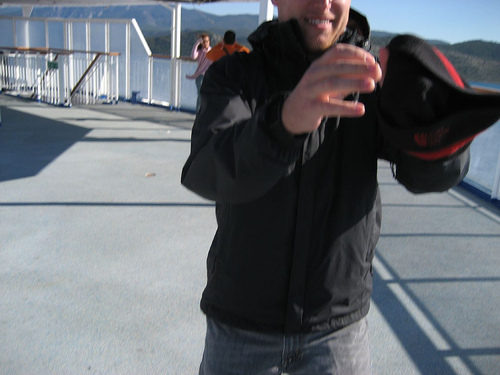
Well before last fall's national elections, before the terms "red" and "blue states" saw their most recent heyday, Michael Wolff wrote this:
There is a fundamental schism in American cultural, political, and economic life. There’s the quicker-growing, economically vibrant…morally relativist, urban-oriented, culturally adventuresome, sexually polymorphous, and ethnically diverse nation… and there is the small town, nuclear-family, religiously-oriented, white-centric other America [with] …its diminishing cultural and economic force… [T]wo nations… – New York, Feb 26 2001, p. 19
Its interesting because its true. I know, because I've lived on both sides of the schism. I grew up on the small town, nuclear-family, religiously-oriented, etc. side of the fence. Since college, I feel I've been living smack in the middle of the quicker-growing, culturally adventuresome, etc. nation. For the purposes of clarity, I'll refer to the first nation Wolff mentioned - the quicker growing, more diverse, as the Metro nation. And the second as the Micro nation. Neither term should place any implications upon how I view them, I use both to refer to exactly what Wolff originally cited about each.
I should point out some important exceptions to my personal experience. On both sides. While I don't need to harp on the exceptions to the Micro nation I was reared in - for example the ethnic diversity present in California that I was exposed to, or the large-city feel where we lived - I would be remiss if I didn't note my exceptions to the Metro nation I now reside in. While I have lived in and among the morally relativist and sexually polymorphous, God's grace has guided me away from such persuasions. Yet, living in this vibrant Metro nation, one has no choice but to be acutely aware of their perpetual and very loud existence. On the other hand, different fingers: the economic vibrance, the urban orientation and cultural adventuresome nature of first nation - all things that I've very much enjoyed delving into.
With such qualifications in place, I offer a comparison. In the days of the earliest church, the mission field before the apostles was quite the same as the 2 nations we see now here in America. There was a fundamental schism in the world (and namely in Asia Minor and modern day Europe) that presented interesting quandaries to the furtherance of the gospel. Thankfully, God provided wise men to deal with such a breach, 2 cultures existing in limbo, appearing to move in opposite directions. It is interesting to note that, looking back, we can speculate as to how much movement is actually taking place, if we are indeed seeing the same in our nation today.
Cities like Rome, Corinth, Thessolanica, Athens, Ephesus, and Antioch. All were cities for the same reason that American cities are what they are today - or, more accurately, where they are: the rule of real estate. Location, location, location. Some were key ports for ocean-going vessels (like our own New York, San Francisco, Boston), others were situated at the cross-roads of major shipping and travel routes (our own St. Louis, Dallas, Denver, Salt Lake City). And still others were central to entire realms for purely political reasons (we have one of those in particular in America, too, and we built it on a swamp, for some reason).
And large cities, whether of the first century AD or of this century, by their very nature, present the characteristics of the Metro nation. In one way or another, they become the cultural melting pots, and what naturally emerges from the stew of mankind seems to be no different today than it was in the first century. The cities of old were economically vibrant, morally relativist, sexually polymorphous, ethnically diverse, and so on.
With such a comparison tendered, I pose a question. Will God yet again raise up wise men to face the schism head-on? Men ready to 'stand in the gap' before Him and deal with the 2 nations? And if so, what will they look like?
I believe they would look like Paul. Paul saw the ministry opportunities before him, and he didn't head to the Micro nation. Paul headed straight to the climes least likely to accept what he preached. His ministry was almost entirely aimed at the Metro nation. He realized that these cities, while diverse, and very often morally base, would be the first-adaptors, the launch-pad for the church to come. Paul knew that cultural change throughout the land would begin in the cultural centers, and acted accordingly.
He knew that as one man, he could see only so many small churches in the countryside, and that - while every soul in the fly-over land of old was just as valuable as the souls of the city - he would be most effective in the long run by focusing on the Metro nation. He sought to not remain culturally-centric, family-driven, or even religiously-oriented. And we should remember that such jumps were much larger for Paul in his day than they would be in ours - he lived in a time of brutal cultural opposition, a day when the family structure was the only norm - and in fact a very means of survival. Religions abounded then certainly as they do now, but the interesting thing about Christianity is that it continues to exist as more than a religion, just as it did in Paul's day.
Will God raise up men willing to run head-first into the arenas that would ultimately exile or even kill them? He did before. I believe He will continue to do so. I hope in my life to find such men and to learn a Metro nation approach to the furtherance of the Gospel from them - one that does not fear the Metro nation movement, but accepts it for what it is, sees where it is going, and simply acts accordingly to bring the relevance of the Gospel to bear upon it.















2 comments:
You should send this to Eric, Relevantmagazine.com's God main page editor (eric@relevantmagazine.com), or me (deeperwalk@relevantmagazine.com) in MS Word with a two-line bio.
Excellent post. I agree with almost everything. I do wonder how much Paul would have been willing to describe his goals as cultural change. He certainly believed God had people to be saved in those cultural centers, which is why he went there, but I very much doubt changing the culture was even something he thought about.
Post a Comment